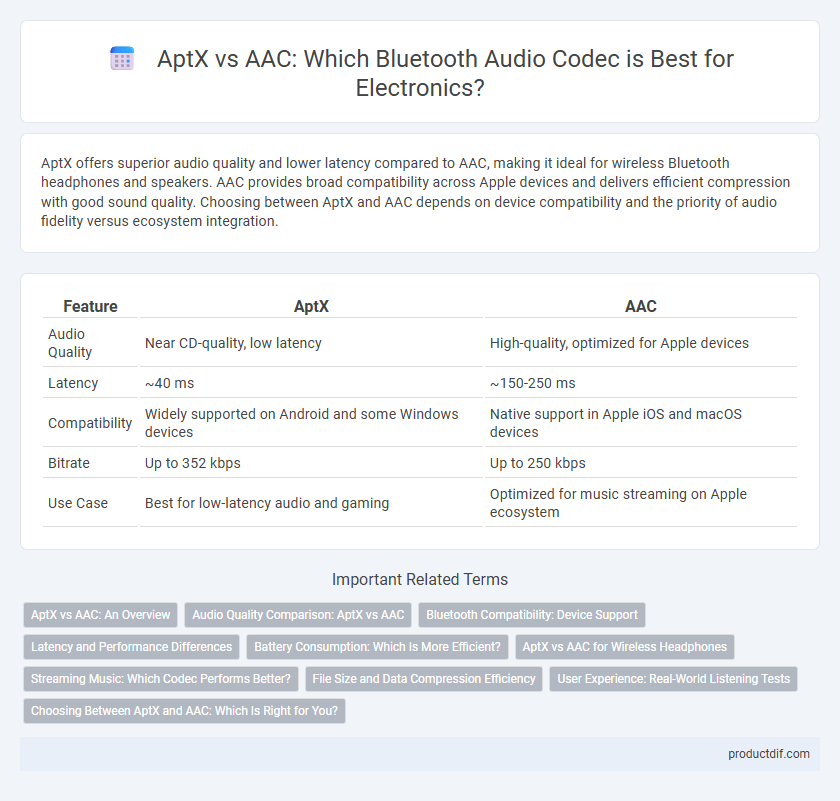AptX offers superior audio quality and lower latency compared to AAC, making it ideal for wireless Bluetooth headphones and speakers. AAC provides broad compatibility across Apple devices and delivers efficient compression with good sound quality. Choosing between AptX and AAC depends on device compatibility and the priority of audio fidelity versus ecosystem integration.
Table of Comparison
| Feature | AptX | AAC |
|---|---|---|
| Audio Quality | Near CD-quality, low latency | High-quality, optimized for Apple devices |
| Latency | ~40 ms | ~150-250 ms |
| Compatibility | Widely supported on Android and some Windows devices | Native support in Apple iOS and macOS devices |
| Bitrate | Up to 352 kbps | Up to 250 kbps |
| Use Case | Best for low-latency audio and gaming | Optimized for music streaming on Apple ecosystem |
AptX vs AAC: An Overview
AptX and AAC are popular audio codecs used in Bluetooth devices, with AptX favored for its low latency and high-resolution audio streaming, particularly on Android platforms. AAC, supported natively by Apple devices, delivers efficient compression and consistent audio quality, optimized for iOS ecosystem compatibility. Choosing between AptX and AAC depends on device compatibility, with AptX preferred for reduced latency in gaming and video, while AAC excels in seamless integration with Apple hardware.
Audio Quality Comparison: AptX vs AAC
AptX offers superior audio quality compared to AAC by providing higher bit rates and lower latency, which result in clearer sound and a more immersive listening experience. AAC, while widely compatible and efficient, typically compresses audio more aggressively, leading to slight loss in detail and dynamic range. For critical audio applications, especially on devices supporting Qualcomm chips, AptX delivers enhanced fidelity and better preservation of original sound characteristics.
Bluetooth Compatibility: Device Support
AptX offers widespread compatibility with many Android devices and select Bluetooth headphones, delivering high-quality audio through Qualcomm's codec technology. AAC is the default codec for Apple devices like iPhones, iPads, and MacBooks, ensuring superior sound quality within the iOS ecosystem. Understanding each codec's device support is essential for optimal Bluetooth audio performance across platforms.
Latency and Performance Differences
AptX offers lower latency, typically around 40 milliseconds, which is ideal for gaming and video synchronization, whereas AAC exhibits higher latency, often exceeding 100 milliseconds, affecting real-time audio experience. AptX delivers more consistent sound quality on Bluetooth devices supporting Qualcomm chipsets, while AAC performs better on Apple devices due to optimized codec integration. Both codecs provide efficient audio compression, but AptX's superior latency and performance differences make it preferable for latency-sensitive applications.
Battery Consumption: Which Is More Efficient?
aptX codec generally consumes more battery power than AAC due to its higher processing requirements for low-latency, high-quality audio streaming. AAC is optimized for efficient performance on Apple devices, resulting in lower battery consumption during wireless audio playback. Users seeking longer battery life typically benefit more from AAC, especially on iOS platforms, while aptX favors superior audio quality but at the cost of increased power usage.
AptX vs AAC for Wireless Headphones
AptX offers superior audio quality over AAC in wireless headphones by maintaining higher bit rates and lower latency, enhancing music and video synchronization. AAC, commonly supported by Apple devices, delivers efficient performance but may introduce audio compression artifacts in complex soundscapes. For audiophiles seeking crisp, low-latency wireless audio, especially on Android devices, AptX-enabled headphones provide a clearer and more immersive listening experience.
Streaming Music: Which Codec Performs Better?
AptX delivers higher audio fidelity through lower latency and better compression efficiency, making it suitable for high-quality Bluetooth streaming. AAC offers broader device compatibility and consistent performance, especially within the Apple ecosystem, ensuring seamless streaming across iOS products. When streaming music, AptX excels in preserving audio clarity on supported devices, whereas AAC provides more reliable playback on a wider range of hardware.
File Size and Data Compression Efficiency
AptX employs a compression algorithm designed to maintain high audio quality with lower latency, resulting in efficient data compression that typically produces smaller file sizes compared to AAC at similar bit rates. AAC achieves broad device compatibility with effective compression but often requires higher bit rates to match the audio fidelity of AptX, leading to larger file sizes. When comparing file size and data compression efficiency, AptX tends to outperform AAC by delivering superior sound quality at reduced file sizes in Bluetooth audio streaming applications.
User Experience: Real-World Listening Tests
AptX offers lower latency and higher bitrate audio transmission, resulting in clearer sound and improved synchronization with video during real-world listening tests. AAC is widely supported across Apple devices and delivers efficient compression, providing consistent audio quality with reduced power consumption. Users seeking minimal audio lag and enhanced clarity often prefer AptX, while AAC serves as a reliable choice for seamless integration in the Apple ecosystem.
Choosing Between AptX and AAC: Which Is Right for You?
Choosing between AptX and AAC depends on your device compatibility and audio quality preferences. AptX offers superior Bluetooth audio compression with lower latency and higher fidelity, ideal for Android users and those seeking premium sound experience. AAC is widely supported on Apple devices, providing efficient compression and consistent quality, making it the optimal choice for iOS users and streaming services like Apple Music.
AptX vs AAC Infographic

 productdif.com
productdif.com